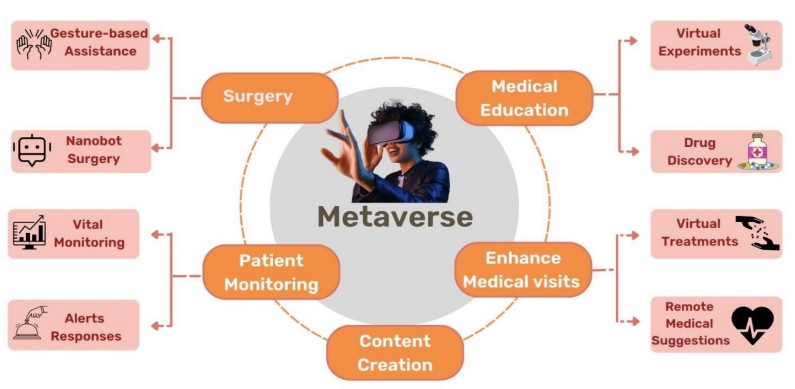If you are interested in products and services related to the research phase in this field, please contact for further inquiries.
The healthcare metaverse represents a revolutionary integration of advanced technologies such as augmented reality (AR), virtual reality (VR), artificial intelligence (AI), and blockchain, creating an immersive virtual environment that redefines healthcare delivery. This digital realm offers unprecedented opportunities to enhance patient care, medical education, and remote healthcare services, promising a future where healthcare is more accessible, efficient, and personalized than ever before.
 Fig.1 Applications of Healthcare Metaverse. (Athar A., et al., 2023)
Fig.1 Applications of Healthcare Metaverse. (Athar A., et al., 2023)
The Rise of the Healthcare Metaverse
The rapid advancement of technology has catalyzed a transformation across various industries, with healthcare emerging as a significant beneficiary. The COVID-19 pandemic accelerated the demand for remote healthcare solutions, propelling the healthcare metaverse into the spotlight. This virtual environment allows for seamless interactions between patients and healthcare providers, leveraging AR and VR to create immersive experiences that mimic real-life interactions. The integration of AI and blockchain further enhances data security and precision in medical decision-making.
Applications of the Healthcare Metaverse

Enhanced Medical Visits
The healthcare metaverse facilitates virtual consultations, enabling patients to receive medical advice without the need for physical visits. This is particularly beneficial for patients with chronic conditions, mental health issues, or those living in remote areas. For instance, patients with cardiac issues can undergo virtual consultations, receiving timely medical advice and performing basic health tests at home, such as measuring blood pressure and heart rate, and sharing this information with their healthcare providers in real-time.

Surgical Procedures
The metaverse has the potential to revolutionize surgical procedures by providing surgeons with advanced tools and immersive environments. The use of VR in surgery can enhance precision and efficiency, allowing for more complex and intricate operations. For example, SNU Bundang Hospital's smart operating room has demonstrated the potential of metaverse VR in lung surgery, using a 360-degree virtual reality camera and high-resolution imaging equipment. This technology can also be applied to other surgical fields, such as plastic surgery, where virtual avatars can predict the outcomes of procedures with high accuracy.

Medical Education
The healthcare metaverse offers a unique learning environment for medical students and professionals. AR and VR technologies can simulate complex surgical procedures, providing hands-on experience without the risks associated with real surgeries. Medical schools and universities are increasingly adopting these technologies to train their students, offering virtual experiences that mimic real-life clinical scenarios. The metaverse also facilitates collaboration among medical professionals from different parts of the world, enhancing their diagnostic capabilities and providing better treatment outcomes.

Patient Monitoring
During the COVID-19 pandemic, remote patient monitoring became a necessity. The healthcare metaverse provides a platform for continuous patient monitoring, allowing healthcare providers to track vital signs and health conditions in real-time. This is particularly beneficial for patients with chronic conditions who require ongoing care and attention. The metaverse also enables virtual interactions between patients, their families, and healthcare providers, fostering better communication and collaboration, ultimately improving patient outcomes.
Challenges in the Healthcare Metaverse
- Deepfakes and Spoofing Attacks
One of the most significant challenges in the healthcare metaverse is the threat of deepfakes and spoofing attacks. Deepfakes, which are manipulated images or videos that appear authentic, can compromise the integrity of patient data. Spoofing attacks can alter or steal patient information, leading to misdiagnoses and inappropriate treatments. Ensuring the authenticity of data in the metaverse is crucial, as medical professionals rely on accurate information to make informed decisions. The use of blockchain technology can provide a potential solution by ensuring data integrity and security. However, the development of robust authentication mechanisms is essential to prevent spoofing attacks and protect patient data.
- Information Leakage
The healthcare metaverse involves the exchange of sensitive patient information between healthcare providers and patients. This information can be vulnerable to leaks, posing a significant risk to patient privacy. Cybersecurity measures must be strengthened to prevent unauthorized access and data breaches. Healthcare providers must implement stringent data protection protocols to safeguard patient information. This includes encryption, secure communication channels, and regular security audits. Additionally, patients must be educated on the importance of protecting their personal information and the potential risks associated with sharing it in a virtual environment.
- Establishing Trust
Building trust between stakeholders in the healthcare metaverse is paramount. Patients must have confidence in the security and reliability of the virtual healthcare services they receive. Healthcare providers, insurance companies, and pharmaceutical companies must work together to establish transparent and secure platforms for delivering healthcare services. Transparency in data handling and usage is essential to build trust. Patients should be informed about how their data is collected, stored, and used. Additionally, healthcare providers must ensure that their virtual platforms comply with regulatory standards and best practices in data security.
- Legal and Regulatory Challenges
The rapid growth of the healthcare metaverse has outpaced the development of regulatory frameworks. There is a need for clear guidelines and regulations to govern the use of virtual healthcare services. Regulatory bodies must address issues such as data privacy, patient consent, and the liability of healthcare providers in virtual environments. Healthcare providers must also navigate the complexities of insurance coverage and reimbursement for virtual healthcare services. The lack of standardized policies can create confusion and barriers to the adoption of the healthcare metaverse. Collaboration between healthcare providers, insurance companies, and regulatory bodies is essential to develop comprehensive policies that support the safe and effective use of virtual healthcare services.
- Usability Among the Visually Impaired Population
The healthcare metaverse, while highly beneficial for many, may pose challenges for individuals with visual impairments. The reliance on visual elements in AR and VR environments can limit the accessibility of these technologies for blind or low-vision users. Ensuring inclusivity in the healthcare metaverse requires the development of alternative interaction methods and assistive technologies. Healthcare providers and technology developers must work together to create accessible virtual environments. This includes the use of audio descriptions, haptic feedback, and other assistive technologies to ensure that all patients can benefit from the healthcare metaverse.
Future Work and Conclusion
The healthcare metaverse holds immense promise for transforming healthcare delivery. Future research should focus on developing robust security mechanisms to protect patient data from deepfakes and spoofing attacks. Efforts should be made to enhance the usability of virtual environments for individuals with visual impairments. Regulatory frameworks must be established to govern the use of virtual healthcare services, ensuring patient safety and data privacy.
As we look to the future, the healthcare metaverse represents a transformative shift in the delivery of healthcare services. Its potential to enhance patient care, medical education, and remote healthcare services is immense. However, the successful implementation of the healthcare metaverse requires addressing significant challenges related to data security, privacy, trust, and regulatory frameworks. By leveraging the power of AR, VR, AI, and blockchain technologies, the healthcare industry can overcome traditional limitations and provide better care to patients worldwide. The journey towards realizing the full potential of the healthcare metaverse will require collaboration, innovation, and a commitment to addressing the challenges that lie ahead.
If you have related needs, please feel free to contact us for more information or product support.
Reference
- Athar, Ali, et al. "Applications and possible challenges of healthcare metaverse." 2023 25th International Conference on Advanced Communication Technology (ICACT). IEEE, 2023.
This article is for research use only. Do not use in any diagnostic or therapeutic application.



 Fig.1 Applications of Healthcare Metaverse. (Athar A., et al., 2023)
Fig.1 Applications of Healthcare Metaverse. (Athar A., et al., 2023) 


